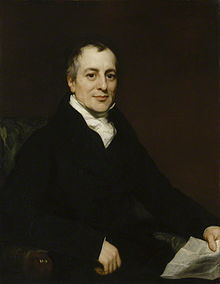David Ricardo Background Information
David Ricardo was born on April 18th, 1772 in London and died on September 11th, 1823. David was the third child in a jewish family that had immigrated from the Netherlands. His father was a successful stock broker who had made a fortune on the London Stock Exchange. At 14 David began to follow in his father's footsteps, but by 21 they had split due to religious differences. David still did well for himself by making a small fortune, which allowed him time to study his interests such in literature and science.

https://en.wikipedia.org/wiki/David_Ricardo
At 27, David began to take an interest in economics after reading Adam Smith's The Wealth of Nations. This prompted him to write his first economic article on the bullion controversy. At the time, the banks of London weren't backed by gold and so were generating bills and loaning at an exaggerated rate. The country was deeply divided at the time over whether this was causing the inflation that the country was seeing, or not. David Ricardo took the stance that the banks loaning rates and generation of bills was irresponsible and a direct cause of the inflation in his book The High Price of Bullion, a Proof of the Depreciation of Bank Notes. Both the controversy of the matter and the way that David phrased and constructed his ideas brought this book a lot of attention, making David a public figure in the economic field.
David Ricardo went on to publish many more books, letters and articles before he died, including Essay on the Influence of a Low Price of Corn on the Profits of Stock (1815) and his most famous economic work Principles of the Economy and Taxation (1817). He later retired and bought a seat in the House of Commons in 1819. In 1823 he retired from the House due to sickness and died later that year.
Although David Ricardo had a short career as an economist, his ideas were still respected at the time and he is still considered the individual who systemized economics. The abstract way that he presented his ideas was unique and prompted a lot of economists after him to adopt his ideas and improve upon them.
References
https://www.britannica.com/biography/David-Ricardo
http://www.econlib.org/library/Enc/bios/Ricardo.html
http://www.encyclopedia.com/people/social-sciences-and-law/economics-biographies/david-ricardo
http://www.victorianweb.org/economics/ric.html

https://en.wikipedia.org/wiki/David_Ricardo
At 27, David began to take an interest in economics after reading Adam Smith's The Wealth of Nations. This prompted him to write his first economic article on the bullion controversy. At the time, the banks of London weren't backed by gold and so were generating bills and loaning at an exaggerated rate. The country was deeply divided at the time over whether this was causing the inflation that the country was seeing, or not. David Ricardo took the stance that the banks loaning rates and generation of bills was irresponsible and a direct cause of the inflation in his book The High Price of Bullion, a Proof of the Depreciation of Bank Notes. Both the controversy of the matter and the way that David phrased and constructed his ideas brought this book a lot of attention, making David a public figure in the economic field.
David Ricardo went on to publish many more books, letters and articles before he died, including Essay on the Influence of a Low Price of Corn on the Profits of Stock (1815) and his most famous economic work Principles of the Economy and Taxation (1817). He later retired and bought a seat in the House of Commons in 1819. In 1823 he retired from the House due to sickness and died later that year.
Although David Ricardo had a short career as an economist, his ideas were still respected at the time and he is still considered the individual who systemized economics. The abstract way that he presented his ideas was unique and prompted a lot of economists after him to adopt his ideas and improve upon them.
References
https://www.britannica.com/biography/David-Ricardo
http://www.econlib.org/library/Enc/bios/Ricardo.html
http://www.encyclopedia.com/people/social-sciences-and-law/economics-biographies/david-ricardo
http://www.victorianweb.org/economics/ric.html
Ricardo is the economist who first discussed the concept of economic rent. At the time wealthy landowners earned considerable income from the passive activity of letting their land to a tenant farmer. Ricardo was concerned that this would suck out resources from the economy that could instead be used on productive activities. The issue continues to plague us till this day, though the source of rents is now more intellectual property than anything else. We will see that rents can serve a productive purpose, however, as a way to address opportunism within the organization.
ReplyDeleteOn a more mundane note, in future posts could you please include a subject line. (There should be a place in the Blog Editor for that. Put it there rather than in the body of the post.) That helps to identify your post, to others, for example in your Blog archive.
The rent concept is interesting. I think I saw something like that once on an episode of Shark Tank where a man pitched a business idea that revolved around buying up patents on possible future products and then selling them to companies who actually had the product in the future. That probably doesn't relate to the productive rents that you are talking about though.
DeleteI went back and edited the subject line. I'm not sure how I missed that the first time around. I'll make sure not to miss it in the future.